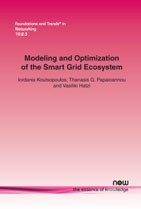Modeling and Optimization of the Smart Grid Ecosystem
By Iordanis Koutsopoulos, Athens University of Economics and Business , Greece, jordan@aueb.gr | Thanasis G. Papaioannou, Athens University of Economics and Business , Greece, pathan@aueb.gr | Vasiliki Hatzi, University of Thessaly, Greece, vahatzi@uth.gr
Abstract
The smart energy grid has evolved into a complex ecosystem, with new entering actors such as aggregators, and traditional ones like consumers, operators and generators having fundamentally different, active roles in the system. In addition, advances in key technologies such as renewables, energy storage, communication and control have paved the way to new research directions and problems. In this work we attempt to give some structure to the complex ecosystem above, and we present key research problems that shape the area. The emphasis is on the control and optimization methodology toward approaching these problems. The first thread we consider is demand-response where the central theme is to optimize the demand load of consumers. The basic problem is the scheduling of demand load of consumers with the aim to minimize a cost function from the point of view of the utility operator or the consumer. Next, we review fundamental problems in energy storage management. The basic energy storage management problem amounts to deciding when and how much to charge and discharge the battery in order to achieve a certain optimization objective, either in terms of a generation cost or a mismatch between energy demand and supply, which again may capture the goals of the consumer or the utility. We also discuss the market interactions of various entities in the smart grid ecosystem and the impact of their strategic decisions on the market structure. Finally, we study key aspects of consumer behavior such as response to gamification models, and uncertainty due to consumer decisions that influence the system, and we discuss the role of data in building data-driven models for predicting consumer behavior. For each problem instance above, we provide an exposition that places emphasis on the related model and on key aspects of the analysis.
Modeling and Optimization of the Smart Grid Ecosystem
The aim of the smart electric energy grid is to improve efficiency, flexibility, and stability of the electric energy generation and distribution system, with the ultimate goal being the added value of energy-related services to the end-consumer and to facilitate energy generation and prudent consumption toward energy efficiency. New technologies, such as networks and sensors, are combined with consumer behaviour to create a complex eco-system in which many factors interact.
Modeling and Optimization of the Smart Grid Ecosystem gives some structure to the complex ecosystem and surveys key research problems that have shaped the area. The emphasis is on the presentation of the control and optimization methodology used in approaching each of these problems. This methodology spans convex and linear optimization theory, game theory, and stochastic optimization.
Modeling and Optimization of the Smart Grid Ecosystem serves as a reference for researchers wishing to understand the fundamental principles and research problems underpinning the smart grid ecosystem, and the main mathematical tools used to model and analyze such systems.
